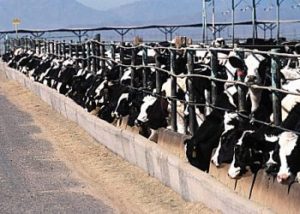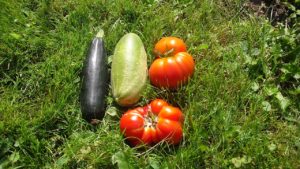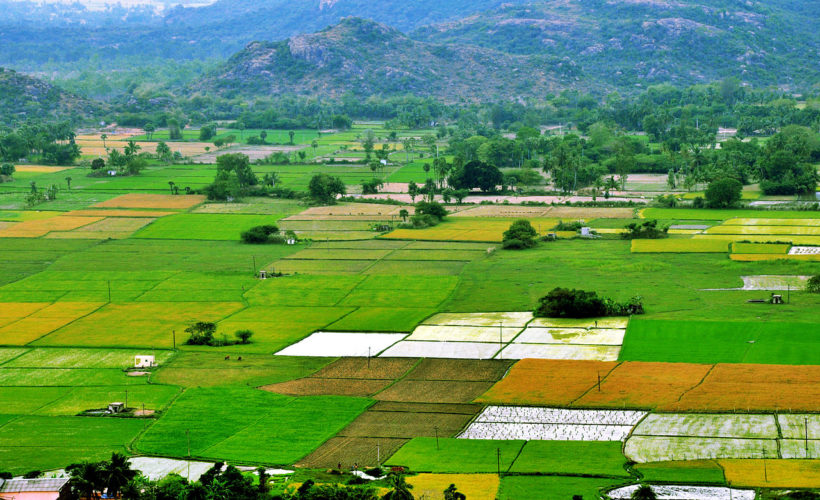 By Alexis Schaffer
By Alexis Schaffer
These days farms are like any other corporation – maximizing profits is priority number one. But at what cost?
Here we look at how consumerism is driving our food producers to more unethical and unsustainable practices for the sake of short-term profit. Industrial farming gave rise to what are known as ‘factory farms.’ According to the ASPCA, “Over 95% of farm animals in the U.S. are raised in factory farms, which focus on profit and efficiency at the expense of product quality and animal welfare.
To maximize output, animals are raised in overcrowded cages. Then they’re given painful physical alterations such as teeth-clipping and tail docking without anesthetic. With neglectful animal to worker ratios; treatment and proper care for the animals is lacking. Animals in these ‘factory farms’ are often physically abused, as shown on many popular documentaries such as Food Inc.

Avoiding meat products by eating a vegetarian or vegan diet can be a healthy way to completely eliminate your endorsement of this treatment. For those not wanting to give up meat, shopping at grocery stores who participate in the Global Animal Partnership as Whole Foods does, can ensure your animal products were raised in more acceptable conditions.
Looking for labels that are third-party verified such as the ‘Certified Humane’ or ‘Animal Welfare Approved’ certifications can also help establish the animals quality of care. Shopping at your local farmer’s market is another great option that allows you to speak directly with producers and question their farming practices. As farmer’s market suppliers are local, many allow tours of the farm so you can verify conditions yourself as well.
On overcrowded farms, high amounts of antibiotics are often used preemptively due to infectious living conditions – which have serious health consequences and can be transferred to people who consume their products. Consuming animal products that have been given antibiotics so frequently leads to antibiotic resistance. The Centers for Disease Control and Prevention (CDC) estimated 2 million Americans each year experience infections that are unable to be treated by standard antibiotics – resulting in 23,000 annual deaths.
Additionally, poor air quality due to unclean conditions, chemical use and mass amounts of animal waste cause animal, worker, and local resident health complications. It’s estimated that 89,000 pounds of excrement are produced every second! As a result, toxic gases and bacteria enter the air and are carried by the wind to local residents. This can lead to lung infections, brain damage, and birth defects.
While the air pollution caused by factory farming causes health and quality of life problems it also decreases real estate value. Waste and chemicals drain into water sources and nearby residents often have to deal with unpleasant smells, sounds, and views. Researchers at the University of Missouri found that every factory farm in the state depresses surrounding property values by a staggering $2.68 million.
With limited space comes the need to eliminate anything that could interfere with their crop yield. To achieve this, farmers look to pesticides. To avoid reduction of yield, farmers douse their produce with insecticides, herbicides, rodenticides, bactericides, fungicides, and larvicides. Designed to kill, these chemicals have very real side effects on our health and environment.
“Taking into consideration the health and environmental effects of chemical pesticides, it is clear that the need for a new concept in agriculture is urgent.” The Department of Pathology of Athens University states in a study looking at the chemical burden agricultural industrialization has.
This study linked pesticide use to nervous system disorders, birth defects, and cancer. People are introduced to pesticides by oral, dermal and inhalation exposure. Those most at risk of experiencing negative effects due to pesticide use are children, the elderly, pregnant woman, those already facing a health challenge, and people who live near farms.

Shopping organic is a great way to make sure the food you eat has not been treated with harmful chemicals. It also ensures that your meat hasn’t been injected with hormones and antibiotics that can transfer to your body. Food that has the USDA Organic label on it verifies that your food has upheld USDA Organic Standards. These products can be found at grocery stores around the country as well as local farmers markets.
On the farmers side, vertical farming is an alternative way for farmers to maximize the efficacy of their land without resorting to heavy chemical usage. To eliminate the risk of drinking water contamination, land desertification and degradation, hydroponic farming is another great alternative to traditional farming. This type of farming can actually increase the rate of plant growth by 25% while producing 30% more than plants grown in soil.
Industrial farming doesn’t just decrease the quality of our food. It also harms our health, our environment, leads to animal cruelty, and isn’t sustainable. The U.S. Environmental Protection Agency and state governments have not successfully regulated the impacts this type of farming has on our environment. Consequently, giving free rein to the farmers – regardless of the damage they are causing.
The Food and Agriculture Organization of the United States estimated that 37% of methane emissions come from animal agriculture. That’s 20 times the global warming potential of carbon dioxide emissions. But that’s not all the harm it’s doing though. This sort of farming leads to deforestation, drinking water contamination, and desertification as fertile soil is leached of its nutrients from overuse.
A solution to this massive amount of greenhouse gas emission is integrating livestock and crops. Utilizing a system called Managed intensive rotational grazing could help reverse these adverse effects. Natural ruminants such as cattle can assist in the spreading of nutrients to nutritionally depleted soil while avoiding the stockpiling of manure that’s responsible for high amounts of methane emission in the industrialized systems used today.
With the industrialization of farming came a series of problems that impact economic, social and environmental wellbeing. Biased food distribution, overexploitation of water and land, overuse of chemicals, inhumane treatment of animals, and the degradation of our environment have all been the result.
These are problems that are mostly unable to be addressed by local governing agencies as most farming practicing laws fall under federal jurisdiction, making it difficult for lawmakers to fully understand local impacts. The good news is, consumerism is the force that led us here and it can be what turns it around.
Farmers only grow what sells – we as the consumers have the power to change that. The agricultural industry is a tough one. If a product or practice doesn’t sell, the farmers are forced to change their ways or risk losing their business. Shopping responsibly sourced meat and produce by utilizing certifications that verify quality and care is a vote for better standards.
Furthermore, getting yourself to the next town hall meeting to share these concerns with your community can have a significant impact. Local governing agencies may not be as aware of the issues that come with responsible consumption as you think. After all, understanding the obstacles we face and our ability to affect them is the first step to progressive change – even when it comes to the food we eat.

Alexis Schaffer received her undergraduate degree in psychology and is a registered nurse. In her free time she teaches yoga and writes for various online publications. She’s also the proud dog mom of a beagle named Dobby.



Leave a Reply